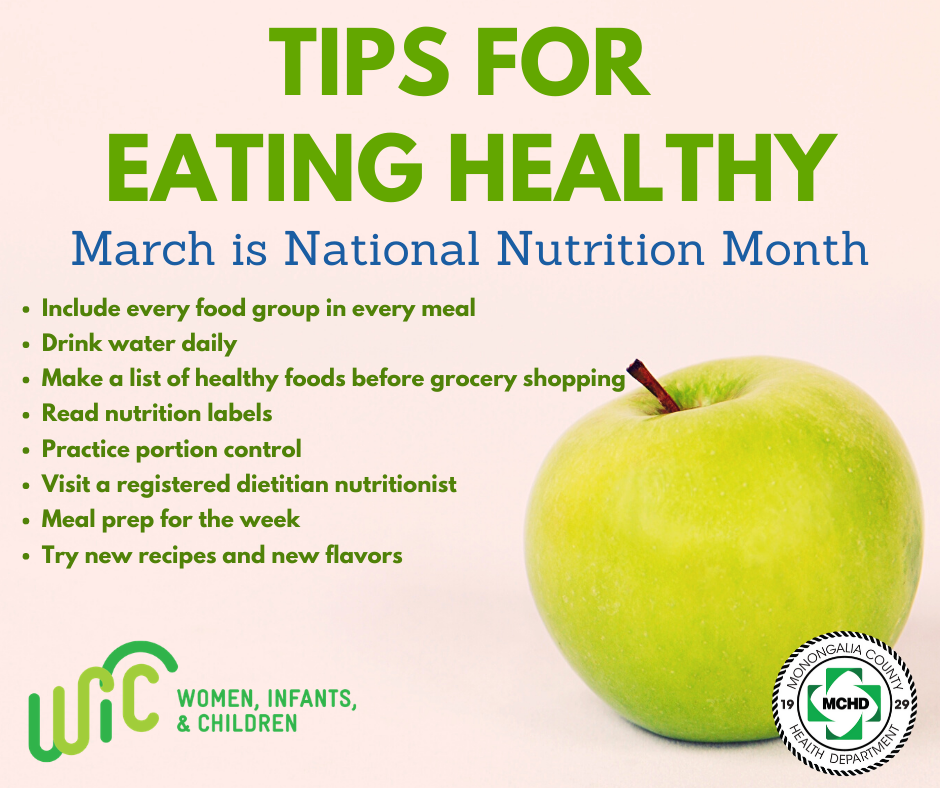Thinking of tweaking your diet for health? March is a great time to do that.

Feb. 26, 2020
By Kenzie Bostick
Everyone is always told they should eat healthy, but how many people actually do it? For National Nutrition Month, we should all try to be more aware of what we eat and how it can impact our health.
According to the Centers for Disease Control and Prevention, just one in 10 children and adults eats the recommended daily amount of vegetables. The number of people not getting enough fruit in their diet isn’t much better, with only one in seven adults and four in ten children eating enough. Each meal should include a grain, protein, fruit, dairy, vegetables and oil.
Eating healthy will not be as beneficial if you eat too much, though. Practicing portion control is a key step in ensuring that you are getting the amount of each nutrient that you need.
Eating healthy can take some planning ahead. It all starts at the grocery store. Make a list of healthy foods before you go shopping, so you’re less likely impulsively throw those cookies or ice cream in the shopping cart. Try planning your meals for the week in advance, so you are less likely to eat unhealthy snacks and meals because you’re hungry.
If you do end up eating out, just remember that many restaurant foods have a very large number of calories and are often unhealthy. Many restaurant meals can be made yourself at home, with a healthier recipe and smaller portions. It’s hard to make eating healthy a habit if you dread eating the foods. Learning how to cook new meals and experimenting with new flavors can make eating healthy seem more fun.
In order to know if you are eating healthy or not, you must learn how to correctly read nutrition labels. You should begin by reading the serving size and total calories per serving. Next, you should read the percent daily values. These are normally based on a 2,000-calorie diet. You should eat foods low in added sugar, sodium and saturated fat. Aim for a high percentage of vitamins, minerals and fiber.
An often-overlooked part of nutrition is staying hydrated. The daily recommended amount varies by age, sex and whether you are pregnant or breastfeeding. While drinking water by itself is a great way to stay hydrated, there is also water from foods and drinks that counts toward your daily recommended amount.
We should be eating healthy every month, not just during National Nutrition Month, but it is a great reminder of the importance of making good choices about what goes in our bodies. If you really need help figuring out how to get the right amount of nutrients, see a registered dietitian nutritionist.
Are you a pregnant or breastfeeding mother or the parent or guardian of children up to the age of 5? If you meet certain income guidelines, you would be eligible to receive services from Monongalia County Health Department's Women, Infants and Childrens (WIC) program. These include nutritional counseling and help with purchasing grocery items such as fruits, vegetables, peanut butter, yogurt, cereal, bread and more.
MCHD WIC has offices not only in Monongalia County, but also Preston, Marion, Harrison, Doddridge and Taylor. For more information, call MCHD WIC at 304-598-5181.
Kenzie Bostick is a public information intern at Monongalia County Health Department.